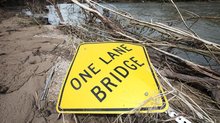Are you as a horse owner prepared for a major disaster where your horses may be at risk and you will need to know the basics of what to do in handling and evacuating your horses?

Handling and evacuating horses in an emergency
In a natural disaster involving horses or other large animals, a community Large Animal Response Team can mean the difference between rescue and injury/death.
The Center for Equine Health at UC Davis has joined forces with the Western Institute for Food Safety Security (WIFSS) and the International Animal Welfare Training Institute (IAWTI) at UC Davis to develop a training program for first responders and community volunteers.
This training will allow individuals in the community to work with their local Office of Emergency Services in handling and/or evacuating horses and other large animals during a natural disaster.
Even the smallest communities have an emergency operations plan that describes how government and private organizations coordinate in a crisis. Emergency managers, animal control officers, and police or fire department officials are usually in charge of such a plan. Does your community's plan include an animal component? If not, you may be able to help develop one.
Animal disaster volunteers who are called to action during emergencies work in hazardous situations and handle stressed animals. Large animals in particular can be dangerous under these circumstances.
To keep everyone safe, training is essential and required in order to be allowed to help in a disaster. The level of training necessary depends on the level of risk, and volunteers may be expected to continue training on a yearly basis to ensure their safety or increase their skill levels.
Why should you become involved?
Previous disasters have taught us that the majority of animal owners are reluctant to evacuate without their animals. In many cases, this puts them in direct danger and complicates rescue efforts. Yet, in spite of federal and state laws that were passed after Katrina to include provisions for pets in a disaster, a significant number of states still do not have plans that include animals.
Even within the states that do, it is up to individual cities, counties and communities to prepare to carry out the plans with rescue workers who are trained to handle animals. (Note: First responders also must be trained to handle animals, particularly large animals.)
In a natural disaster involving horses or other large animals, a community Large Animal Response Team can mean the difference between rescue and injury/death. And because access to disaster relief efforts will be limited to those who are trained responders, itâs important to organize, train and become certified in large animal disaster response.
Communities who regularly battle fire (San Diego County, Los Angeles County) or flooding have learned that a well-organized and trained Large Animal Response Team can work directly with their local Office of Emergency Services to rescue horses and other animals affected by disaster.
People who are prepared
- Can be their own solution
- Know their animals best
- Let first responders focus on the disaster
Many opportunities exist throughout the horse community to become involved in making disaster preparedness a reality. Please take advantage of this great opportunity to benefit yourself and your entire community! If you are unable to volunteer yourself, your support of training programs can also make a difference.
Resources:
DANR Guide to Disaster Preparedness: http://www.vetmed.ucdavis.edu/iawti/local-assets/pdfs/DANRGuide2.pdf
Natural Disaster: Are You and Your Horse Ready? http://www.thehorse.com/features/35909/natural-disaster-are-you-and-your-horse-ready
The Horse Report on Disaster Preparedness with videos: http://viewer.zmags.com/publication/e8f9c6af#/e8f9c6af/1
Animals in Disaster Training Courses (Western Institute for Food Safety & Security at UC Davis): http://www.wifss.ucdavis.edu/?page_id=6687
